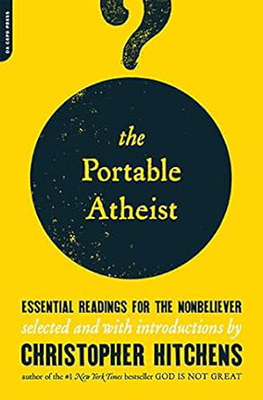The Portable Atheist
“The Portable Atheist: Essential Readings for the Nonbeliever” is a collection of writings compiled and edited by Christopher Hitchens, published in 2007. It features excerpts from various atheist, agnostic, and secularist authors throughout history, providing a diverse array of perspectives on religion, skepticism, and humanism. Here’s a summary:
Main Theme:
The book aims to showcase the intellectual richness and diversity of atheist thought, spanning different historical periods, cultures, and philosophical traditions. It presents atheism not as a monolithic ideology but as a broad spectrum of perspectives united by a common skepticism toward religious beliefs and supernatural claims.
Key Contents:
Historical Perspectives: The anthology includes writings from ancient Greek philosophers such as Epicurus and Lucretius, who questioned traditional religious beliefs and advocated for naturalistic explanations of the universe. It also features excerpts from Enlightenment thinkers like David Hume and Thomas Paine, who critiqued religious dogma and defended reason and science.
Literary and Scientific Voices: The collection includes contributions from prominent literary figures and scientists, including Mark Twain, Bertrand Russell, and Richard Dawkins. These authors explore themes such as the absurdity of religious doctrines, the importance of critical thinking, and the wonder of the natural world.
Political and Social Critiques: The anthology features writings that address the social and political implications of religious belief, including critiques of religiously motivated violence, discrimination, and censorship. Authors such as Salman Rushdie and Ayaan Hirsi Ali offer firsthand accounts of the personal and societal challenges posed by religious extremism.
Ethics and Humanism: The collection includes reflections on secular ethics and humanistic values, exploring how individuals can lead meaningful and ethical lives without relying on religious authority. Authors such as Albert Einstein and Kurt Vonnegut discuss the importance of compassion, empathy, and social justice in a secular worldview.
Purpose and Impact:
“The Portable Atheist” serves as a comprehensive resource for atheists, agnostics, and skeptics seeking intellectual ammunition and inspiration in their rejection of religious belief. It challenges readers to critically examine their assumptions about religion and to explore alternative perspectives on life, morality, and the universe.
Legacy:
The book has become a seminal text in the atheist literature canon, inspiring readers to explore the diverse range of atheist thought and to engage in informed discussions about religion and its role in society. While not without its critics, “The Portable Atheist” continues to provoke thought and spark debate among believers and nonbelievers alike.

